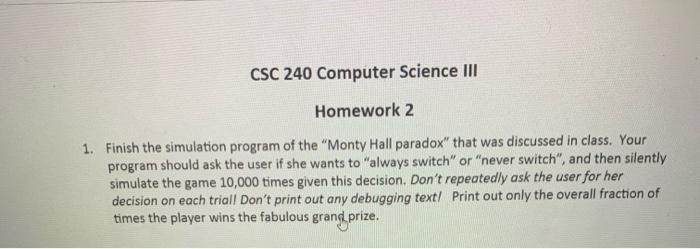Answered step by step
Verified Expert Solution
Question
1 Approved Answer
Could anyone please help me with this? package com.company; import java.util.*; class Door { boolean open; boolean hasGrandPrize; boolean chosenByContestant; } public class Game {
Could anyone please help me with this?
package com.company; import java.util.*; class Door { boolean open; boolean hasGrandPrize; boolean chosenByContestant; } public class Game { Door door1, door2, door3; void setUpGame() { door1 = new Door();door2 = new Door();door3 = new Door(); // initialize all the Door variables to false Random r = new Random(); int grandPrizeDoor = r.nextInt(3); switch(grandPrizeDoor) { case 0: door1.hasGrandPrize = true; break; case 1: door2.chosenByContestant = true;break; case 3: door3.chosenByContestant = true;break; } } void printStateOfDoors() { System.out.println("Door 1 is " + (door1.open ? " open, " : "not open, ") + (door1.hasGrandPrize ? "is the grand prize, and " : "is not the grand prize, and ") + (door1.chosenByContestant ? "is chosen." : "is not chosen.") ); System.out.println("Door 2 is " + (door2.open ? " open, " : "not open, ") + (door2.hasGrandPrize ? "is the grand prize, and " : "is not the grand prize, and ") + (door2.chosenByContestant ? "is chosen." : "is not chosen.") ); System.out.println("Door 3 is " + (door3.open ? " open, " : "not open, ") + (door3.hasGrandPrize ? "is the grand prize, and " : "is not the grand prize, and ") + (door3.chosenByContestant ? "is chosen." : "is not chosen.") ); } public class Game { Door door1, door2, door3; void setUpGame() { // shown earlier} door1 = new Door();door2 = new Door();door3 = new Door(); public void contestantChooseDoor(); Random r = new Random(); int contestantDoor = r.nextInt(3); switch(contestantDoor) { case 0: door1.chosenByContestant = true; break; case 1: door2.chosenByContestant = true; break; case 2: door3.chosenByContestant = true; break; } } } public class PlayManyGames { public static void main(String[] args) { Game theGame = new Game(); theGame.setUpGame(); theGame.printStateOfDoors(); theGame.contestantChooseDoor(); theGame.printStateOfDoors(); } } public static class Game { Door door1, door2, door3; public static Random r = new Random(); void setUpGame() { int grandPrizeDoor = r.nextInt(3); switch(grandPrizeDoor) { // etc. } public void contestantChooseDoor(); { int contestantDoor = r.nextInt(3); switch(contestantDoor) { // etc. } } import java.util.*; class Door { boolean open; boolean hasGrandPrize; boolean chosenByContestant; } public class main{ Door door1, door2, door3; void setUpGame() { door1 = new Door();door2 = new Door();door3 = new Door(); // initialize all the Door variables to false Random r = new Random(); int grandPrizeDoor = r.nextInt(3); switch(grandPrizeDoor) { case 0: door1.hasGrandPrize = true; break; case 1: door2.chosenByContestant = true;break; case 3: door3.chosenByContestant = true;break; } } void printStateOfDoors() { System.out.println("Door 1 is " + (door1.open ? " open, " : "not open, ") + (door1.hasGrandPrize ? "is the grand prize, and " : "is not the grand prize, and ") + (door1.chosenByContestant ? "is chosen." : "is not chosen.") ); System.out.println("Door 2 is " + (door2.open ? " open, " : "not open, ") + (door2.hasGrandPrize ? "is the grand prize, and " : "is not the grand prize, and ") + (door2.chosenByContestant ? "is chosen." : "is not chosen.") ); System.out.println("Door 3 is " + (door3.open ? " open, " : "not open, ") + (door3.hasGrandPrize ? "is the grand prize, and " : "is not the grand prize, and ") + (door3.chosenByContestant ? "is chosen." : "is not chosen.") ); } public static class Game { Door door1, door2, door3; void setUpGame() { // shown earlier} door1 = new Door(); door2 = new Door(); door3 = new Door(); void contestantChooseDoor () { Random r = new Random(); int contestantDoor = r.nextInt(3); switch (contestantDoor) { case 0: door1.chosenByContestant = true; break; case 1: door2.chosenByContestant = true; break; case 2: door3.chosenByContestant = true; break; } } } public static class PlayManyGames { public static void main(String[] args) { Game theGame = new Game(); theGame.setUpGame(); theGame.printStateOfDoors(); theGame.contestantChooseDoor(); theGame.printStateOfDoors(); } } public static class Game { Door door1, door2, door3; public static Random r = new Random(); void setUpGame() { int grandPrizeDoor = r.nextInt(3); switch (grandPrizeDoor) { // etc. } } void contestantChooseDoor() { int contestantDoor = r.nextInt(3); switch (contestantDoor) { // etc. } } } I have this code for this problem, but It does not work

Step by Step Solution
There are 3 Steps involved in it
Step: 1

Get Instant Access to Expert-Tailored Solutions
See step-by-step solutions with expert insights and AI powered tools for academic success
Step: 2

Step: 3

Ace Your Homework with AI
Get the answers you need in no time with our AI-driven, step-by-step assistance
Get Started


